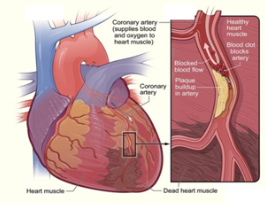Cardiovascular

(formally Acute Coronary Syndromes)
The theme initial aims were to investigate Acute coronary syndrome (ACS). ACS refers to a group of conditions that are due to decreased blood flow in the coronary arteries in the heart. When untreated, part of the heart muscle is unable to function properly or dies. This syndrome is typically caused by a blood clot forming on a narrowing in one or more of the arteries supplying the heart. This makes the artery very narrow and usually causes chest pain at rest.
The disease can range from a tight narrowing – which causes pain but no damage – to a complete blockage causing a major heart attack. This is a common condition and many hundreds of patients attend our major centres every year. Patients often receive invasive treatment to open up the arteries to improve blood flow to the heart muscle and this can save lives.
This theme has collated anonymised clinical information on patients presenting with this condition from five of the UK’s major cardiac centres, including Imperial, University College London, St Thomas’, Oxford and King College Hospital. data includes information on the state of the arteries and the heart muscle and a measure of the degree of damage to the heart. This information is being used by NHS researchers to help our understanding of the factors that are important in the outcome of patients with acute coronary syndromes and will be publishing first results.
The database has been fully reviewed by the National Research Ethics Service.
Further Information:
For research queries please contact Dr Jamil Mayet via imperial.cvhic@nhs.net
Lead centre:
NIHR Imperial Biomedical Research Centre
